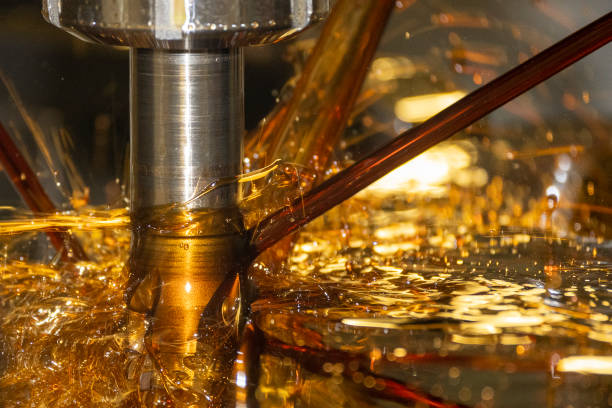We often take for granted the many small but vital components that keep our industrial world running smoothly. One such unsung hero is industrial lubricant. These specialized oils and greases may not get much fanfare, but they play an absolutely essential role in maintaining and protecting industrial equipment of all kinds.
Industrial lubricants help reduce friction and wear in machinery, keeping parts moving freely and smoothly. This prevents overheating, damage, and breakdowns. Lubricants also help seal out contaminants, prevent rust and corrosion, transmit power, protect against shock loading, and even cool equipment. Without proper lubrication, industrial processes would quickly grind to a halt.
Sealing and Protecting
In addition to reducing friction and wear, industrial lubricants provide vital sealing and protection functions. They help seal out dirt, dust, water, and other contaminants that can damage equipment. Lubricants also form a protective film that prevents rust and corrosion on component surfaces. This preservation of parts is critical to long equipment life.
Specialized Formulations
The most common types of industrial lubricants include hydraulic fluids, gear oils, compressor oils, turbine oils, greases, and metalworking fluids. Each has been carefully engineered to meet the needs of different applications. Hydraulic fluids, for example, transmit power in hydraulic equipment. Gear oils protect gears against wear and pitting. And greases provide lasting lubrication on rolling element bearings.
Choosing the right lubricant is critical. Factors like operating temperatures, types of motion, desired service life, and exposure to contaminants must all be considered. Using the wrong lubricant can lead to a host of problems including inadequate lubrication, component failure, and contamination.
Advances in Technology
Industrial lubricant formulations have come a long way from early animal and vegetable-based oils. Today’s lubricants use highly refined mineral oils and increasingly advanced synthetic bases. Additive packages provide enhanced performance properties from detergents and dispersants to anti-wear, anti-foam, and anti-oxidant agents. The latest breakthrough is the development of “smart fluids” that can automatically react and adapt to changing operating conditions.
Proper Application and Maintenance
The proper application and maintenance of lubricants is just as important as choosing the right formulation. Contamination is the number one cause of industrial lubricant failure. Regular oil sampling, filtration, and replacement intervals help combat this. Proper re-greasing procedures, surface preparation, and component cleaning also play a key role.
Research and Development
Behind the scenes, lubricant suppliers work closely with equipment manufacturers on research and development. Formulations are rigorously tested to meet industry and OEM specifications. Technical expertise and services aim to help companies maximize the benefits of lubricants. Training programs teach workers how to properly select, apply, monitor, and maintain lubricants.
Wide Ranging Impact
Though hidden from view, lubricants impact practically every industrial sector including construction, mining, oil and gas, food processing, pharmaceuticals, chemicals, pulp and paper, electric power, metals and more. Next time you see a turbine spinning effortlessly, conveyor belt gliding silently, or robot arm pivoting smoothly – you can thank industrial lubricants. These unsung heroes work nonstop to reduce friction and wear, prevent damage, seal out contaminants, transmit power, dissipate heat and keep the wheels of industry turning 24/7.
The True Workhorses
Industrial lubricants are the true workhorses that keep our modern economy running. Think of the sheer scale and nonstop nature of industrial activity. Massive excavators dredging up minerals. Steel mill rollers spinning endlessly. Robot arms in auto plants welding and assembling 24/7. All this frictional stress takes an enormous toll without proper lubrication.
These heavy duty oils and greases prevent an immense amount of mechanical wear and failure. In a way, they absorb and dissipate massive amounts of friction so that engines, bearings, gears, and other components don’t have to. Well-lubricated parts last significantly longer. Downtime is reduced. Maintenance costs drop. Productivity increases.
Lubricants also play a major role in energy efficiency. Their friction reducing abilities help machinery operate with less power input. Conveyor systems, compressors, pumps, motors and more can achieve major energy savings through proper lubrication. The sustainability benefits are substantial.
Adapting to Future Needs
As industry continues evolving, lubricants must adapt as well. Automation, advanced materials, increased precision, and extreme operating conditions all shape lubrication requirements. Formulators respond with synthesized fluids for ultra-low temperatures or vacuum environments. Smart lubricants sense changing viscosity needs. Nanotech additives boost performance. Industry-academia partnerships spur innovation.
By silently smoothing the way, industrial lubricants facilitate and support progress itself. Their incremental advances enable broader industrial breakthroughs. So, in an indirect but profound way, lubricants contribute to human betterment and rising living standards. They may operate obscurely, but their impact resonates widely. These unsung heroes are indeed the lifeblood of industry itself.
The Skilled Lube Tech
Of course, lubricants can only do their job if properly applied by skilled personnel. The lubrication technician, or lube tech, plays a key role in keeping industrial equipment running smoothly.
Lube techs must understand oil formulations, viscosities, and additives to select the right product for each application. They follow strict protocols for oil changes, grease repacking, and contamination control. Routine oil sampling and analysis helps the lube tech identify issues before problems occur.
Proper lubricant storage, handling and disposal are important as well. Safety training and procedures ensure oil spills are avoided. And sustainability best practices like re-refining waste oil give used lubricants renewed purpose.
Final words
White industrial lubricants may not get top billing, their supporting role is truly mission-critical. These obscure oils and greases keep factory machines, heavy equipment and industrial operations running efficiently and reliably. Without them, assembly lines would halt, gears would grind to a stop, and the engines of industry would seize up. From massive bearings to miniature precision parts, remember to thank these humble but indispensable substances. For though hidden from sight, industrial lubricants keep our modern industrial world humming along smoothly day in and day out.








